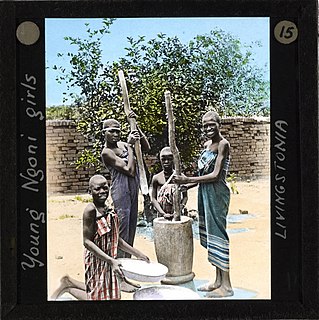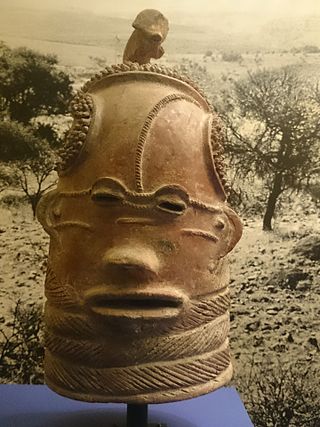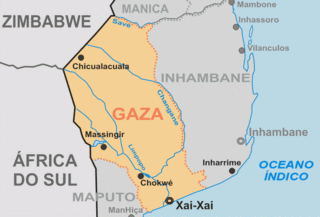
Eswatini, officially the Kingdom of Eswatini and also known by its former official name Swaziland, is a landlocked country in Southern Africa. It is bordered by Mozambique to its northeast and South Africa to its north, west, south, and southeast. At no more than 200 km (120 mi) north to south and 130 km (81 mi) east to west, Eswatini is one of the smallest countries in Africa; despite this, its climate and topography are diverse, ranging from a cool and mountainous highveld to a hot and dry lowveld.

Zulu people are a Nguni ethnic group native to Southern Africa. The Zulu people are the largest ethnic group and nation in South Africa, with an estimated 10–12 million people, living mainly in the province of KwaZulu-Natal.

Artifacts indicating human activity dating back to the early Stone Age have been found in the Kingdom of Eswatini. The earliest known inhabitants of the region were Khoisan hunter-gatherers. Later, the population became predominantly Nguni during and after the great Bantu migrations. People speaking languages ancestral to the current Sotho and Nguni languages began settling no later than the 11th century. The country now derives its name from a later king named Mswati II. Mswati II was the greatest of the fighting kings of Eswatini, and he greatly extended the area of the country to twice its current size. The people of Eswatini largely belong to a number of clans that can be categorized as Emakhandzambili, Bemdzabu, and Emafikamuva, depending on when and how they settled in Eswatini.

Swazi culture is the way of life and customs of the Swazi people through various historical stages. The culture of Swazi people involves music, food, religion, architecture, and kinship, among many other things. The Swazi people are composed of various Nguni clans who speak the Nguni language siSwati. These people mostly reside in Eswatini and South Africa. Presently, Swazi people may also include citizens of Eswatini. In Eswatini, one of the most visible features of cultural identity is the traditional political structure of the nation and the home. In the national level, the Ngwenyama is considered the head of the nation alongside the Ndlovukati who is the spiritual leader of the nation. National cultural events often involve the Ngwenyama or Ndlovukati. At home, the patriarch of the family is the head and often practices polygamy. This headman, usually referred to as umnumzane is central to all activities of the home. A group of homes forming a community and the land they reside on forms a chiefdom or umphakatsi. Several chiefdoms form an inkhundla which then belongs of a regional division of the country. This connects the older traditional leadership structures to more modern forms of government.

The Swazi or Swati are a Bantu ethnic group native to Southern Africa, inhabiting Eswatini, a sovereign kingdom in Southern Africa, and South Africa's Mpumalanga province. EmaSwati are part of the Nguni-language speaking peoples whose origins can be traced through archaeology to East Africa where similar traditions, beliefs and cultural practices are found.

The Ndwandwe are a Bantu Nguni-speaking people who populate sections of southern Africa. They are also known as the Nxumalo's

Lobamba is a city in Eswatini, and is one of the two capitals, serving as the legislative, traditional, spiritual, seat of government of the Parliament of Eswatini, and Ludzidzini Royal Village, the residence of Queen Ntfombi, the Queen Mother.
Heritage Day is a South African public holiday celebrated on 24 September. On this day, South Africans are encouraged to celebrate their culture and the diversity of their beliefs and traditions, in the wider context of a nation that belongs to all its people.

The Ngoni people are an ethnic group living in the present-day Southern African countries of Malawi, Mozambique, Tanzania, Zimbabwe, and Zambia. The Ngoni trace their origins to the Nguni and Zulu people of kwaZulu-Natal in South Africa. The displacement of the Ngoni people in the great scattering following the Zulu wars had repercussions in social reorganization as far north as Malawi and Zambia.
Mnguni was the leader of the Nguni nation in who reached Southern Africa migrating from the North and also the father of King Xhosa. The Xhosa people, today considered a sub-nation of the Nguni nation, were historically referred to as AbeNguni. Mnguni's name derives from the word Nguni, the name for the major ethnicity in South Africa. It now includes the Zulus, Xhosas, Ndebeles and Swazis among others.
Soshangana Ka Gasa Zikode, born Soshangana Nxumalo, was the Founder and the Monarch of the Gaza Empire, which at the height of its power stretched from the Limpopo river in southern Mozambique up to the Zambezi river in the north. Soshangana ruled over the Gaza state from 1825 until his death in 1858. Soshangana was also known by the name of Manukosi.

South African Bantu-speaking peoples represent the majority ethno-racial group of South Africans. Occasionally grouped as Bantu, the term itself is derived from the English word "people", common to many of the Bantu languages. The Oxford Dictionary of South African English describes "Bantu", when used in a contemporary usage or racial context as "obsolescent and offensive", because of its strong association with the "white minority rule" with their Apartheid system. However, Bantu is used without pejorative connotations in other parts of Africa and is still used in South Africa as the group term for the language family.

The House of Dlamini is the royal house of the Kingdom of Eswatini. Mswati III, as king and Ngwenyama of Eswatini, is the current head of the house of Dlamini. Swazi kings up to the present day are referred to as Ingwenyama and they rule together with the Queen Mother who is called Indlovukati. The Swazi kings, like other Nguni nations, practice polygamy and thus have many wives and children.

The Mthethwa Paramountcy, sometimes referred to as the Mtetwa or Mthethwa Empire, was a Southern African state that arose in the 18th century south of Delagoa Bay and inland in eastern southern Africa. "Mthethwa" means "the one who rules".

The Gaza Empire (1824–1895) was an African empire established by general Soshangane and was located in southeastern Africa in the area of southern Mozambique and southeastern Zimbabwe. The Gaza Empire, at its height in the 1860s, covered all of Mozambique between the Zambezi and Limpopo rivers, known as Gazaland.

The Nguni people are a cultural group in southern Africa made up of Bantu ethnic groups from South Africa, with offshoots in neighboring countries in Southern Africa. Swazi people live in both South Africa and Eswatini, while Ndebele people live in both South Africa and Zimbabwe.

The Zulu Kingdom, sometimes referred to as the Zulu Empire or the Kingdom of Zululand, was a monarchy in Southern Africa. During the 1810s, Shaka established a standing army that consolidated rival clans and built a large following which ruled a wide expanse of Southern Africa that extended along the coast of the Indian Ocean from the Tugela River in the south to the Pongola River in the north.
Ngwane III was King of kaNgwane from 1745 to 1780. He is considered to be the first King of modern Eswatini. For his name the people were called bakaNgwane and the country was called kaNgwane or lakaNgwane. Ngwane was the son of Dlamini III and Queen LaYaka Ndwandwe. Dlamini was succeeded by Ngwane III his son with Queen LaYaka Ndwandwe. He took over the Dlamini chieftaincy and established settlements south of the Pongola River, later moving them to the north of the river banks. This makes Ngwane and his followers the founders of modern Swaziland. Ngwane ruled his Kingdom from the south east of Swaziland in the present Shiselweni district and his headquarters were called Zombodze at the foot of the Mhlosheni hills. It was at Zombodze that the Nguni ceremony incwala was celebrated for the first time.

The Hlubi people or AmaHlubi are an AmaMbo ethnic group native to Southern Africa, with the majority of population found in Gauteng, Mpumalanga, KwaZulu-Natal and Eastern Cape provinces of South Africa.

Umkhosi Wokweshwama, recently also known as Umkhosi Woselwa, is the annual harvest festival of the Zulu people, observed around the December solstice. It takes place at the Enyokeni Royal Palace in Nongoma, KwaZulu-Natal, and is presided over by the Zulu King, who conducts a tasting ceremony as sacred king, closed by the dashing of a calabash to signify that the people may now enjoy the fruits of the harvest; this role was historically expanded by Shaka to have more military significance with a muster and parade. It was revived by the current king's father, the late King Goodwill Zwelithini kaBhekuzulu in 1990, after a ban by British colonial authorities following the 1879 Battle of Isandlwana and Zulu defeat in the Anglo-Zulu War.












